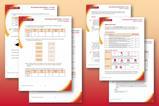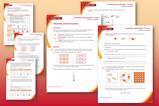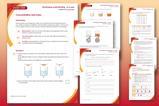Neil Goalby sees exams from the other side – he writes the questions. Although time consuming, he explains it’s enjoyable, creative work that has benefits for teaching. Here’s how he does it

On the lookout for some new challenges in my career, I recently entered the world of writing exams. Having marked exams for many years, this seemed like a natural progression.
For most of my teaching career, I heard teachers talk about ‘the examiners’ and ‘what the examiner is looking for’ until I could almost picture these assessors as mythical creatures sitting on some cloud dispensing judgments. Perhaps that is why writing an exam seemed a little daunting to me at first. It has, however, proved to be a very interesting activity that I’ve learned lots from.
Getting started
The process does not exactly start with a blank sheet. The main syllabus areas for each paper are planned in advance. There is also a blueprint for the paper specifying how many marks there need to be for each assessment objective and how many marks should be aimed at different ranges of ability – not forgetting the 20% mathematics rule now common in chemistry papers. Something else to bear in mind is that the questions should increase in difficulty throughout the paper. But within those requirements, the exam writer has a good deal of freedom when it comes to thinking up ideas and contexts.
Writing the questions
I’ve found the best approach to writing a question is to have a clear idea of what you want the question to test, write the mark scheme first, and only then write the question. This helps to ensure the question is focused and not ambiguous or vague in what it expects of the student.
Some types of question are easier to write than others. For example, it is relatively easy to churn out questions that simply test recall of syllabus content. It’s far more difficult to come up with scenarios for data analysis and new contexts to test the students’ ability to apply their understanding.
Another very important consideration is the level of English in the question. It needs to be clear and simple so the exam tests the students’ scientific ability not their English comprehension – though this does not of course mean that complicated scientific vocabulary cannot be used. In the past, questions often had extra non-essential information setting a context or to add interest, but now the view is that anything not needed to answer the question should not be included. Minimalism is the key aim.
Constructing the paper
Writing a whole paper and trying to make it all fit together can be a challenging puzzle. To keep track of things like the number of marks for each sub-question, what level they are aimed at and what assessment objectives they cover, setting up a spreadsheet can be a great help. Remember also that questions will often need to be rewritten to change their difficulty level or assessment objective to keep the paper within quotas.
Reviewing
The paper will go through several drafts, with several stages of written reviews and meetings to examine the paper in detail. Every aspect of the paper is scrutinised and sometimes argued over. Wording will be changed to make the English clearer, cut out superfluous detail, or alter the level of a question. Sometimes a question is rejected outright and I have to go back to the drawing board. It can be a little disconcerting having your work dissected in such a rigorous way, but undoubtedly the end paper is all the better for it.
What I get out of it
To avoid any possibility of unfair advantage, I do not write the exams that my own pupils take. Nevertheless, the process does bring benefits to my own teaching and to the department. Knowing how exams are written has largely freed me of worry about the new GCSE and A-level exams. Even though I will not see the papers my students will take, I can make good predictions about the sorts of questions they might see, and have been able to focus my teaching on the relevant skills. This is mutually beneficial: I am more confident in preparing my pupils for exams, and experience gained from how my own pupils answer exam questions feeds back into the writing process.
On a personal level, I relish the creativity and challenge involved in the task, and enjoy coming up with new ideas and ways of asking questions. It is also a pleasure to work with – and learn from – a team of very experienced specialists. Writing exams is, undeniably, a time-consuming process. Much of the work is done during weekends and holidays, but overall it is a really useful and interesting process to get involved in.














No comments yet